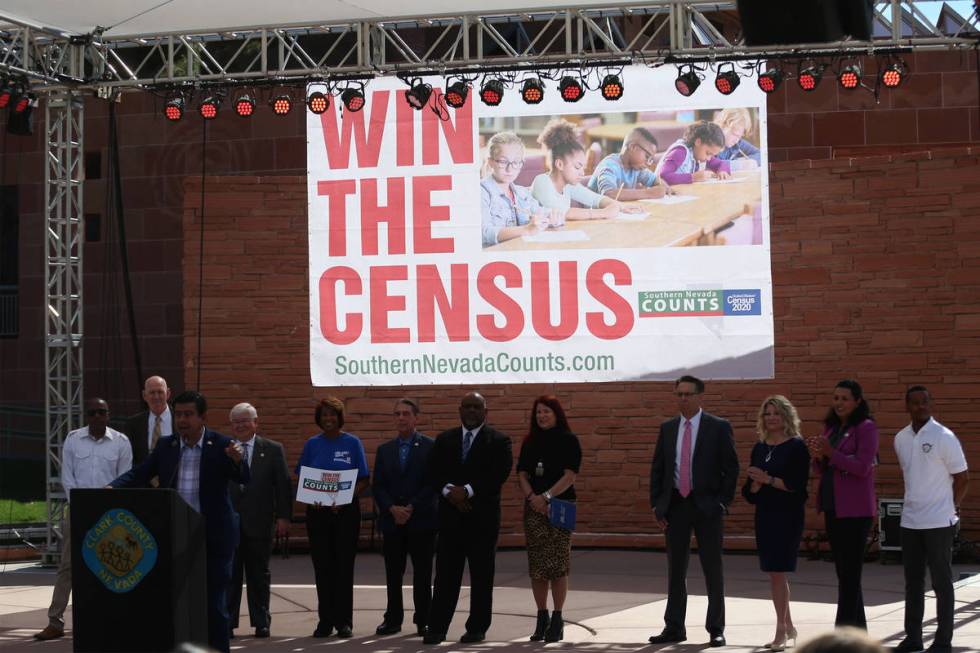Nevada might not get census data in time to redraw districts

CARSON CITY — Delays in data reporting caused by the coronavirus pandemic is likely to push redistricting in Nevada back and require a special legislative session, attorneys for the Legislature told lawmakers Wednesday.
Under the original time frame, states would have received redistricting data from the U.S. Census Bureau by April 1, 2021. That data would then be used by lawmakers to redraw legislative district maps following the once-per-decade census.
But the U.S. Department of Commerce and Census Bureau last month said that the COVID-19 restrictions had all but halted census field operations to ensure public health and safety, and officials asked Congress for a four-month extension.
Under the revised timeline issued by the Census Bureau, however, states wouldn’t receive that data from the federal government until July 31, 2021, some two months after the state’s biennial legislative session would finish.
Because Nevada’s Legislature only meets every other year, that would mean without a special session, lawmakers’ next chance to redraw those districts would come in 2023.
Legal challenge possible
But waiting that long could leave the current plan vulnerable to a legal challenge that probably would lead to a court finding Nevada’s redistricting plan unconstitutional, according to Asher Killian, a senior principal deputy with the Legislative Counsel Bureau’s legal division.
“The bottom line is if the Legislature does not enact a redistricting plan based on the 2020 census before the 2022 elections, there is a significant risk that a court will step in and either order a special session to convene or impose a court-drawn interim plan,” Killian told lawmakers on the committee tasked with planning for the redistricting process.
“Clearly there’s no way we can do it without going to a special session,” said Sen. Pete Goicoechea, R-Eureka, after the meeting.
But Goicoechea, who was serving as an assemblyman the last time the state redrew the maps, said the July 31 date for delivery of the census data might be a little “wishful thinking.”
Response rates vary
According to the latest data from the Census Bureau, 59.3 percent of Nevada households have filled out the census, with the majority using the internet. That rate is just below the 60.2 percent national self-response rate.
But not every part of the state has been that responsive. Some of the state’s most rural counties, including Lincoln and Eureka, have seen less than 15 percent of households report. And in Esmeralda, which claims the second-lowest population density of any county in the continental U.S., that response rate is 3.7 percent.
Those low numbers mean census workers will have to travel to individual homes, which can be spread dozens of miles apart in those parts of the state, to try and get an accurate count of the state’s population.
“There’s still going to have to be a lot of work in field to make sure everyone is accounted for,” Goicoechea said.
Special session or court
As for what the potential special session would look like, Goicoechea said he wouldn’t expect it to take more than a day or two to finalize the redistricting plan once the data was in hand.
A special legislative session seems likely, but a court stepping in wouldn’t be unprecedented in Nevada.
In 2011, the Democratic-controlled Legislature passed two versions of its redistricting plans that were vetoed by Republican Gov. Brian Sandoval. Because no new plan was enacted in the session, the courts intervened and appointed a three-member panel to redraw the boundaries. The panel’s plan received court approval in October 2011.
While the redistricting delay would be caused in part by Nevada’s biennial Legislature, one group is looking to take that power away from lawmakers and put it into the hands of an independent commission.
The group is still trying to gather signatures and has asked the court for more time to collect those signatures before the deadline because the pandemic and shutdown have made it “extremely difficult to collect signatures to qualify the initiative for the ballot in a traditional in-person manner.”
Contact Capital Bureau Chief Colton Lochhead at clochhead@reviewjournal.com. Follow @ColtonLochhead on Twitter.